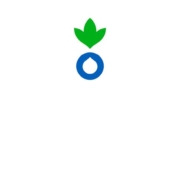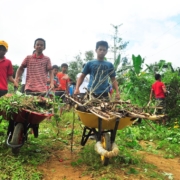STORIES OF CHANGE: INFLUENCING HEALTH CARE SEEKING BEHAVIOR THROUGH NUTRITION-SENSITIVE PROGRAMMING
A young family from Pendolunan Marawi City fled to Malabang, Lanao del Sur when Marawi siege happened in 2017. This is the family of Sohairen Bangon. Sohairen is an 18 months old boy and 2nd child of Acmad Bangon and Juhaina Marohomsar. Their 1st son is also an under 5 years old boy. But life was difficult in Malabang, so they decided that Juhaina and her two children would better stay in Tuca, Madamba Lanao del Sur with her father. While Acmad will work as a tricycle driver in Malabang and sometimes he would visit his family in Tuca.
Juhaina, 22 years old, is a young mother who lacks guidance on how to take care of her children. Her son Sohairen was nutritionally screened by the Rural Health Unit (RHU) staffs and found out that this child has Severe Acute Malnutrition (SAM) earlier of year 2019. Prior to this screening, Sohairen was hospitalized due to Pneumonia. RHU Staff enrolled this child to treatment but became a defaulter. This is because Juhaina was non-compliant to the treatment of her son Sohairen. Whenever they were given Ready-to-Use Therapeutic Food (RUTF) supplies, she gives portion of it to her 1st child. So Sohairen was not receiving the required nutrients pack in the treatment. Their poverty situation all the more aggravated the situation affecting the whole family with the head of the family not having a sustainable job and income enough to provide their basic needs.
Through the project “REACH: Response to the Unmet Humanitarian Needs of the Most Vulnerable Conflict-Affected Populations in Mindanao”, Juhaina attended sessions on hygiene promotion, received hygiene kits and hyposol, and participated in nutrition education and psychosocial support. The REACH team organized a nutrition screening and nutrition education activity in Madamba last December 2019 in which Juhaina’s son, Sohairen, underwent nutrition screening and was still identified with SAM condition. To fully access the project’s health support, Juhaina supported her son on SAM nutrition management and treatment. In coordination with the Municipal Health Office, Sohairen was referred to RHU and started taking RUTF in December 18, 2019.
Since Juhaina’s family was found to be food insecure, she also accessed the project’s cash assistance for food amounting to Php4,320.00. The support enabled her to provide for her family’s food needs for a month, meeting each member’s required daily nutritional needs.
Sohairen’s condition was regularly monitored by the project team from the time he was enrolled in SAM treatment and finally in February 5, 2020, he transitioned to Ready-to-Use Supplemental Feeding (RUSF). “Tumaba na po ang anak ko (My son has gained weight),” Juhaina happily shared during one of the monitoring visits. This improvement was validated by the RHU Nurse saying, “Nag-improve na po ang weight ni Sohairen. Ngayon po itatransition na siya to RUSF (The weight of Sohairen has improved. He will now be transitioned to RUSF).”
This is just one of the stories of hope in saving children like Sohairen and his brother at the same time allowing the mother to eat well and be healthy in preparation for her 3rd baby delivery anytime soon, through the integrated humanitarian assistance provided by the REACH Project.
The Project “REACH” is funded by ECHO and implemented by the consortium Action Against Hunger, Oxfam, ACCORD, with CARE as lead. It aimed to address the unmet humanitarian needs of conflict-affected populations in Mindanao. The project provided support in Food Security and Nutrition, WASH, and access to health services (Primary health care, nutrition and psychosocial support).●




